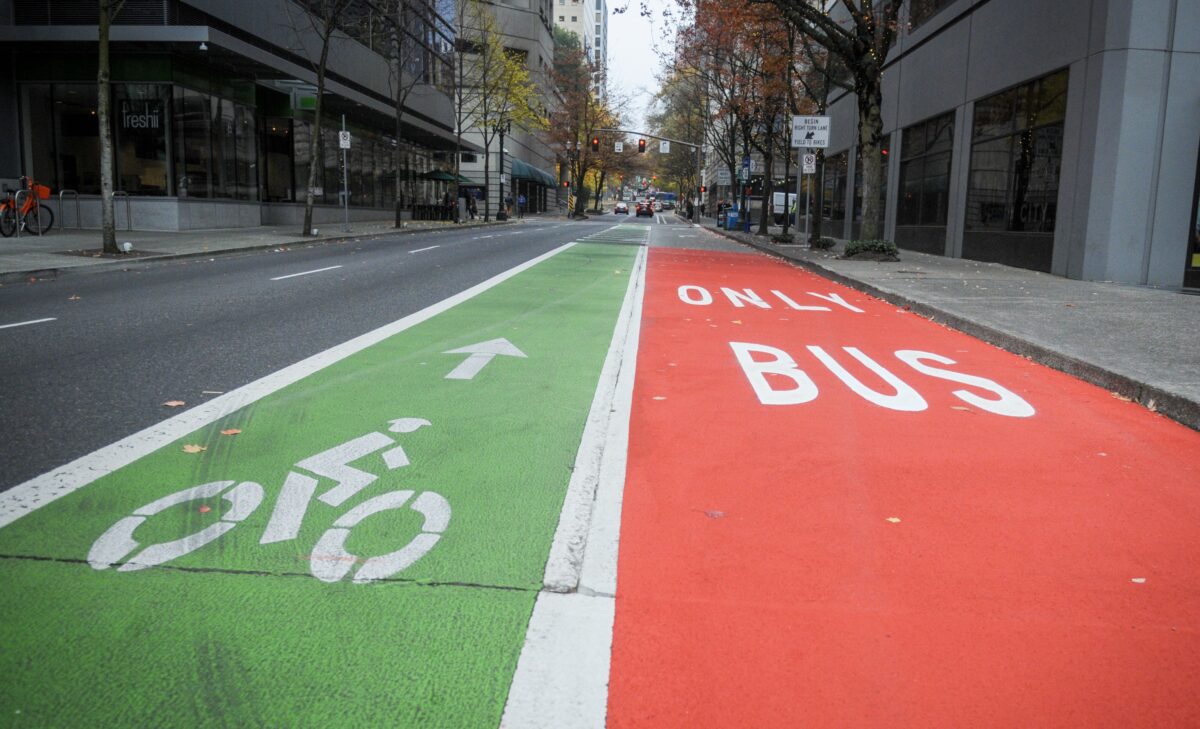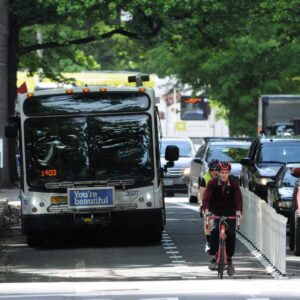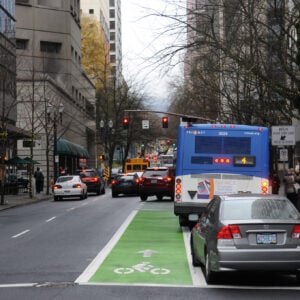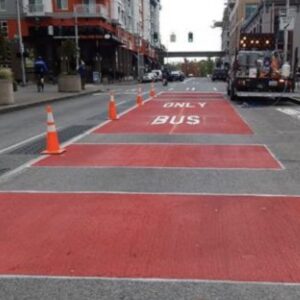
(Photo: J. Maus/BikePortland)
One of the most influential transportation policies Portland has seen in many years has been conceived without general public scrutiny. While the Bureau of Transportation has leaked out a few transit-only lanes in the past few months, a larger and more coordinated effort known as the “Rose Lane Project” (which we first covered back in June) has been percolating in the office of Commissioner Chloe Eudaly and a select group of stakeholders.
The veil around this effort will be pulled back this week when Eudaly shares a report about the Rose Lane Project at City Council at a meeting on Thursday (11/7) evening in southeast Portland.
According to Commissioner Eudaly’s Director of Policy Jamey Duhamel, the report will, “share the ways in which our office is developing authentic relationships with community partners in an effort to redistribute our right of way with a priority around racial equity, climate justice, and direct community benefits.” The stated goal of the project is to “increase transit ridership mode split goals and decrease use of single-occupancy vehicles that contribute significantly to carbon emissions.”
Advertisement
“The Rose Lane Project works with an internal advisory group that includes organizations
with a deep equity lens.”
“Redistribution” of right of way is an interesting term that I don’t recall being used in Portland transportation circles. That nomenclature is more frequently used in economic policy discussions about the redistribution of income and wealth.
What’s also different about this effort, compared to what we’re used to seeing with other transportation policy initiatives, is that it’s been developed entirely out of the public eye — save for a large, invite-only group of advocacy and community organizations. In city council filings made ahead of this week’s meeting, Duhamel said the Rose Lane Project, “works with an internal advisory group that includes organizations with a deep equity lens.”
Duhamel and her team have been working on this plan for nearly a year now. They say since the impacts of the project will be so significant (due to, “increased transit service, new road patterns, changes to street congestion”), they’ve met with the advisory group twice so far and will continue meeting with them until January or February. Member of the advisory group include: The Street Trust, OPAL, Urban League, Oregon Walks, Community Cycling Center, PAALF, Unite Oregon, APANO, Safe Routes Partnership, Better Business PDX, Rosewood Initiative, Portland State, Portland Bus Lane Project, and Verde. So far there have been no public open houses or surveys, and there’s not even a website for the project. It’s expected that a more traditional, public process will get underway later this winter in advance of a possible adoption of the plan by city council in mid-February.
Last week PBOT installed its first-ever red transit-only lanes on SW Main (between 1st and 2nd) and on SE Grand (at Burnside and Couch).
This week’s meeting (strategically for the Rose Lane Project perhaps?) takes place at Portland Community College Southeast Campus (Community Hall, 82nd and Division) at 6:00 pm.
UPDATE and CORRECTION, 2:45 pm on 11/4: This post originally misstated how often Eudaly’s team had met with the advisory group. I’ve also added the member organizations of that group after being contacted by Eudaly’s Communications Specialist Margaux Weeke. Weeke also shared today that, “In no way do we intend to move forward with Rose Lanes without giving the public ample opportunity to provide feedback. We wanted to ensure that we have project maps available for review and clear communication around the impact of these changes to avoid any unnecessary confusion.”
— Jonathan Maus: (503) 706-8804, @jonathan_maus on Twitter and jonathan@bikeportland.org
— Get our headlines delivered to your inbox.
— Support this independent community media outlet with a one-time contribution or monthly subscription.







Thanks for reading.
BikePortland has served this community with independent community journalism since 2005. We rely on subscriptions from readers like you to survive. Your financial support is vital in keeping this valuable resource alive and well.
Please subscribe today to strengthen and expand our work.
Can’t wait for the comments in the Oregonian about how drivers’ “Rights” are being taken away.
Any mention of “Vision Zero?”
I usually just bike in the left lane with the cars because I have to take a left turn a few blocks later. I can’t turn left from that green bike lane.
I think it’s important to portray this policy shift (which is really just an implementation of earlier policy work on the modal hierarchy) using the most radical and potentially inflammatory language possible, and I’m happy to see that Eudaly is, once again, not even pretending to consult with the public, maximizing the chance the project will blow up in her face.
Someone should send her a package of balloons and just watch what happens.
Seeing as consulting with the public generally results in “MOAR CARS” I am all for the adults in the room actually making decisions regardless of what the children will whine about. Democracy is only truly functional within a republic.
I’m not so sure… I attended a general policy forum with Hardesty a while back, and every single person at my table was in favor of some form of bus-only lanes. This was an older, very white, middle class group, coming from different parts of the city. I was the only cyclist at the table.
So rather than prejudge how people might feel about this issue, and preemptively take away their voice because you’re afraid they’ll say something you disagree with, perhaps we should be looking for ways to present this policy in its most palatable form, and build support for the idea so it doesn’t die when Eudaly gets the boot in the next election.
Presenting bus lanes as “redistributive” and “racial equity” is both factually wrong and counterproductive (unless your real goal is more about messaging than making lasting change).
I don’t think that the lack of public meetings is as much as an issue as notifying everyone, minorities and the working poor included, that there a public meeting or set of meetings.
Long gone are the days when everyone listens to radio or watches the same 5 TV networks and gets the daily newspaper delivered to their home. We have so many internet news outlets that most people now tune out and filter what they don’t want to hear or see. Mailing is pointless and expensive, as it is all thrown away or recycled. Half the people Twitter and half don’t, same with Facebook and all the other medias.
Given these limits and meetings held whenever everyone else is working, you end up with the same 20 white elderly folks showing up at every public meeting, design charrette, and open house.
So if you want a good sample of mixed income, race, age, etc at meetings, what PBOT is doing makes a lot of sense.
C’mon…we all know all Old White Men are exactly the same.
Not sure what lead you to inferred and race, gender and age from previous comments … trigger something personal maybe?
Sounds like there is plenty of support already, so what are you concerned about again?
That she’ll give it the kiss of death.
Refreshing. Now bring back fareless square and I will go downtown or through downtown much more often, except via transit or bike. Cars are always in the way.
“…with a priority around racial equity, climate justice, and direct community benefits.”
SMH. It would be much more effective IMO to simply say this will reduce your commute time, save you money by not have to pay for parking and reduce your overall stress by taking the bus instead but, whatever. Emperor Eudaly does what she wants.
Intersectionality>Practicality
If Portland is going to change from its legacy of racist planning and redlining, those words will need to be more than buzzwords. Hence the emphasis from Comm Eudaly.
We can’t change our history; there’s no going back. All we can do is recognize where we’ve improved, and where we’re still falling short. Moving forward is best done through good works rather than talking the talk.
In the face of financial and cultural resistance, both are important.
Does anyone have photos of how they work on burnside/couch? I haven’t made it up there to see the new configuration yet.
There are some red mass transit only lanes on NE MLK where the street car tracks are. Does anyone know if bikes can use the lanes? (I’m guessing not, because it’s not indicated, but that would make it dangerous for bikes on the street. There’s no bike lane or lane to the right. I remember Jonathon writing about riding up the street car lane.)
Hi Steve,
I’m asking PBOT for clarification of that specific installation, but my hunch is that it would be OK for bicycle users to ride there because there is no other dedicated bicycling space available. I am writing an update on the red lanes right now and will include an official statement from PBOT about this. Thanks for asking.
I’m consolidating the City Council information here for ease of access.
2019 November 7th 6:00PM
Rose Lane Project at City Council
@ Portland Community College Southeast Campus, Community Hall
2305 SE 82nd Ave, Portland, OR 97216
Authorization letter for City Council to meet at location for those who care about documentation and process:
https://www.portlandoregon.gov/auditor/article/746255
Let’s see: “between 1st Ave and 2nd Ave” and “between Burnside and Couch” equals exactly two city blocks, right? How is that going to speed up the buses? I know, I know – they are testing “proof of concept.” But I’m guessing it’s more tinkering around the margins and won’t have much impact on bus-journey times – not til the city decides to, say, dedicate an entire lane on Sandy Blvd from 82nd to inner SE.
I agree with all of the comments about Chloe. She has a few good ideas (and also some really terrible ideas) but overall she’s a fatally flawed politician. True leaders bring people along on a journey to a desired destination, instead of shutting them out and essentially telling them “This is what you’re getting – like it or lump it.” She is the best advertisement I’ve ever seen for getting rid of our commission-style gov’t, where amateurs are voted in to screw up the services we are already paying professionals to provide.
Signal controlled intersections are the bottleneck in most surface transportation systems. Transit queue jumps only work if the bus can get to the front of the line. Bus only lanes, especially during commute times as exist on Madison, are one tool to assist letting buses avoid such congestion.
Actually, most of the delays on buses happen at key bottlenecks like this. I know it seems like a small thing but it makes a huge difference. I do think longer transit-only lanes make sense from a user-perspective making it easier to navigate the streets when there is some lane continuity.
There is a notorious “professional” in PBOT who has screwed up everything regarding cycling for so many years it is most refreshing to see “amateur” Chloe begin to accomplish actual useful things at street level.
I have observed City Council for many decades. Let me know when you find a bureaucrat as intelligent and as dedicated as Charles Jordan, Mike Lindberg, Margaret Strachan.
UPDATE and CORRECTION, 2:45 pm on 11/4: This post originally misstated how often Eudaly’s team had met with the advisory group. I’ve also added the member organizations of that group after being contacted by Eudaly’s Communications Specialist Margaux Weeke. Weeke also shared today that, “In no way do we intend to move forward with Rose Lanes without giving the public ample opportunity to provide feedback. We wanted to ensure that we have project maps available for review and clear communication around the impact of these changes to avoid any unnecessary confusion.”
“Redistribution” is the right word. Most people aren’t used to thinking of it in these terms, but any piece of infrastructure is a resource that gets distributed to different users either intrinsically or through laws. A traffic light distributes “seconds of being able to use this intersection” among people approaching from various legs of the intersection. A stop sign does the same thing except it distributes that resource along the lines of who gets to use it next. Lane boundaries painted on a roadway distribute lateral space. Speeds indirectly end up distributing longitudinal space. Crosswalks distribute lateral and longitudinal space, to pedestrians when present or to everybody else otherwise. Parking regulations distribute parking space.
Any revision to a default or existing distribution is a redistribution.
Good for Chloe and good for the city finally getting some leadership. Ask ten Portlanders what we should do about traffic and you would get ten different answers most of them dumb. Good government can’t be crowdsourced. Do you think removing the highway from the waterfront was popular? Or the downtown plan which significantly limited parking and limited building FAR?
Pretending that average citizens have the bandwidth and expertise to tackle big issues is both pandering and ineffective at generating practical solutions. Time to make some bold moves and let the results speak for themselves.
Ask ten government officials/planners what we should do about traffic and you would get ten different answers most of them dumb. Like Rose Quarter expansion. Go big or go home?